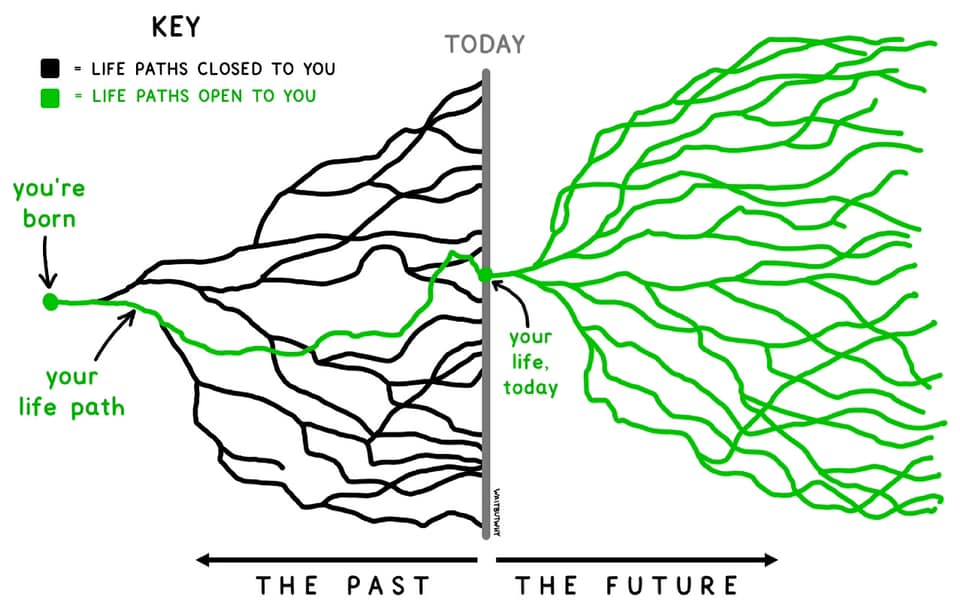To be happy and fulfilled, you may not necessarily need to lead a purposeful life, but it’s certainly far easier if you do.
Living a life of purpose is not something that you have, it’s something that you do.
As I struggle to lead an increasingly purposeful life, I’ve identified nine practical actions you can take now to help you towards the ultimate aim of living a satisfying and rewarding life of purpose.
The challenge for most of us is that we find ourselves trapped into one of two classic mindsets.
Firstly, there are those who focus rigidly on a grand life plan, often not really their own plan. These people are the minority, and at least they attempt to take ownership of their life path even if it’s predicated on goals set by societal conventions.
Secondly, and the majority, are those of us who go with whatever flow they find themselves drifting along within. For many years, this was me. Fortunately, I eventually accepted both that this had to change and that it could change. That I could live a purposeful life, if I chose to do so; it was up to me.
Over the last three years, I have embarked upon a journey of living an increasingly purposeful life by taking these nine courses of action.
Table of Contents
1. Decide That You Will Take Control of Your Life’s Path

In one of the most powerful books ever, Man’s Search for Meaning, Viktor Frankel says that the primary motivational force of any human being is to find meaning in his life.
Published in 1946 and reflecting on his experiences as a prisoner in a Nazi concentration camp, Frankel realized that those prisoners who had the most positive view of their future were more likely to survive.
Very few of us find ourselves in a situation as dire as staring the gas chamber in the face, so if these prisoners are able to take control of their lives, surely we can too. Sure, like the concentration camp prisoner, we don’t have total control of everything that happens to us, but we can control both how we react and the decisions we make.
This is such a critical point that if you struggle to embrace it, I urge you to take further action before you read any more of my post. The best thing you can do is read Man’s Search for Meaning or if you prefer something more modern, try Don’t Believe Everything You Think written by Joseph Nguyen.
2. The Day to Take Charge of Your Life is Today

Once you have accepted that you can control your life’s path, the next thing to do is to act and to do so as soon as possible. Why not today?
Have a look at this diagram:

Obviously, your life’s journey so far is set in stone and can’t be changed. But just look at the options for the future shown in green! If you wait for tomorrow, these options will reduce slightly, and if you let the wait expand into weeks, months or years, your choices will reduce more and more.
In other words, don’t wait. As soon as you understand the value of living a life of purpose and that you have the power to do so yourself, get started right away.
3. Decide What You Want Out of Your Life

In my earlier post Six Steps Along the Simple Path to Happiness, I described how to understand what makes you happy and how to reassess your life’s priorities. These actions are vital if you are to live a life of purpose, as they give you the structure on which to base your decisions. When your decisions support your life’s priorities, you are choosing to take charge of your life’s path.
The toughest part is letting go of the common definitions of success or at the very least questioning them very carefully. If sacrificing much of your life in pursuit of greater financial rewards and more material possessions is what truly will make you happy, then go for it. However, if it’s not, don’t be afraid to be a bit of a weirdo and decide to base your life path on different priorities.
There have been several studies that have tried to determine the link between happiness and income, and they all agree that once we reach a certain level, our happiness doesn’t improve any further. The studies do disagree in terms of what salary is required before happiness stops improving, with the range between $70,000 and $105,000 per year. What is clear is that the income level at which your happiness will stop improving is well below that where you could afford a Lamborghini or a gold-plated toilet.
In other words, while the absence of money can cause unhappiness, once your basic needs are met, additional wealth is unlikely to improve how you feel about your life. So what do you really want from the rest of your life?
4. Be Flexible

When I was a cadet at the Royal Air Force College Cranwell, I was repeatedly taught that flexibility was the key to air power. An air force that can adapt to changing circumstances will dominate a more powerful force that rigidly follows an agenda set at the outset of a conflict. What I now realize is that this is a rule that applies to almost all aspects of life.
Flexibility does not mean flip-flopping whenever the mood takes you, that’s worse than being rigidly focused on plans set in concrete. When you are flexible, you are able to make adjustments by carefully assessing your options against a clear understanding of your life goals and a solid set of personal values.
At a deeper level, you have to periodically review your life goals to ensure that they remain valid. Good decisions made in support of outdated goals will usually compromise your life path.
I recommend reviewing your goals at least once per year. You may not believe that these will evolve in such a short period of time, but the minor changes, that are barely noticed individually, can combine to form a seismic shift. My wife (Monique) and I recently left this for two years and quickly realized that this had been a huge mistake.
So be prepared to be flexible, and embrace and celebrate change. Just do so in a purposeful way.
5. Stop Comparing Your Life to Other People’s Lives

Keeping up with the Jones is an ancient problem and it’s got worse since social media assumed such a dominant role in our lives. Now, we find ourselves comparing our humdrum, everyday lives to the heavily edited ones that our friends broadcast on Instagram. In effect, we are comparing our reality to someone else’s fantasy.
Even if it’s not a fantasy, are we comparing ourselves with something what we even want? You may envy your friend’s brand-new Range Rover, but would you want the payments or to sacrifice the investments that might be the opportunity cost of a flash car?
Once you have decided what you truly want out of life, this step is relatively easy, but until that happens, it’s incredibly difficult to stop assessing our lives in comparison to others.
6. Choose the People in Your Life

Controlling the people you allow into your life does not mean only mixing with those from whom you can benefit materially. It’s certainly not an excuse to be selfish.
Rather, you should maximise your exposure to those who bring you joy, love and who have a positive impact on you. At the same time, you need to limit how much you interact with those who drain your energy, bring negativity into your life or who are downright toxic.
Jim Rohm famously said that we are the average of the five people with whom we spend the most time. It’s been repeated so many times that it’s widely accepted as being absolute truth. However, the data doesn’t support this. We are influenced by a far wider set of people. So rather than worry about the five people with whom you spend the most time, look at the entirety of those in your life.
Often, you can’t or don’t want to simply cut people out of your life. There may be a family member who loves you and who you love dearly, but who does inadvertently bring out the worst in you. Or you may have a wonderful friend who has a spouse that you just can’t stand. I’m always amazed by the number of successful young (and not so young) people who continue to allow their parents to run their lives and make major decisions for them. This is where setting boundaries becomes vital.
Sometimes boundaries will be set organically as a result of your behaviours. If you refuse to engage in gossip, often the other person may stop too, at least around you. If you quietly refuse to lend money to the person who never pays you back, they’ll likely get the message eventually.
However, sometimes this is not enough, especially when it comes to setting boundaries for those closest to you. In such cases, your boundaries will need to be explicitly explained and then reinforced by your behaviours. For example, you may tell family members that you will not tolerate them criticizing your spouse in your presence. Then, if it still happens you remind the culprit of the boundary you have set and, if they persist, remove yourself from the situation. When you do this always remain calm and speak quietly and firmly. You do not want to hand over control of your emotions to someone who refuses to respect your boundaries.
If you think you need help setting and managing effective boundaries Dr Henry Cloud offers a 14-day free trial of his services provided at boundaries.me. It offers practical tools for improving your mental health through the use of boundaries in all aspects of your life, both personal and professional.
7. Assess and Address Life Motivators

What this means in simple terms is understanding the reasons behind your decisions and behaviours. You want to live your life driven primarily by positive motives. Decisions made from love and joy will always make you feel happy. The same applies when your behaviours are the result of healthy life goals and values.
However, when your actions are driven by guilt and feelings of obligation or duty, it’s emotionally draining. Over time, they eat you up, as resentment and bitterness build up inside you. You feel anger towards others, which damages your relationships. If you find complete elimination is not possible you should certainly reduce how often negative emotions dictate your actions.
In such cases, take the time to assess and accept the historically negative emotions behind your decisions. Then tell yourself why you are choosing to do what you are doing because you want to do so. For example, you may continue to lend money to your sibling even if they don’t really deserve it, but do so for positive reasons. Decide that you are no longer doing so out of guilt, but because you choose to support them.
Remember that you can stop at any time you decide to and that you have the power to do so. Finally, remind yourself that if you ever resent your behaviours that are due to negative emotions, the only person you can be angry with is yourself, no one else.
Generally, the better you manage the people you allow into your life and the more effectively you set boundaries, the easier this will be for you. In fact, you will almost inevitably see a reduction in decisions based on guilt or obligation.
8. Don’t Look Back in Anger – But Do Look Back

Regret is a pointless emotion. It allows past mistakes to suck your energy and negatively affect how you feel today. Most of us understand this intellectually but letting go of regret isn’t always easy.
You could just try to forget what happened, but ignoring the past is rarely the answer. Eventually suppressed emotions will bubble to the surface affecting your well-being and that of those closest to you.
Try this instead:
- Assess what happened as dispassionately as you can. What went wrong, what was your contribution and what could you have foreseen and changed?
- Devise a plan of action for what you will do the next time you find yourself faced with similar circumstances.
- Finally, congratulate yourself on the lessons you have learned and forgive yourself of your past mistakes because you have grown as a consequence and are better prepared for the future.
It’s a simple form of positive visualisation of the future and, in many ways, harks back to the teachings of Viktor Frankel in Man’s Search for Meaning.
9. Live Your Life in Bite Size Pieces

Creating ambitious long-term plans is a great thing to do. However, in isolation they can easily become overwhelming. Even worse, if you don’t meet these plans, you can end up with feelings of failure, which in turn may encourage you to give up trying to control your life path. In many cases, the progress you made in this “failure” was, in reality, immense.
The best way to avoid this is to break down plans and goals into smaller, more manageable chunks. Think of it as like losing weight. Dropping 25 kilos by the summer may be daunting but aiming for two kilos by the end of next month may seem far more achievable.
Even when you break things down this way, you need to give yourself permission to fail sometimes. Maybe you didn’t lose any weight this week, but overall, you have lost 8 kilos since you started and that’s success not failure. You should keep going. Maybe you didn’t start your new business, but you’ve secured the funding and registered your company. Again success, not failure.
Living a life of purpose, basing your decisions and actions on clear values, is tremendously worthwhile. You will feel increasingly fulfilled and happy. You will have better relations with those who are important to you and be more successful in ways that actually matter to you. While it is easier to just go with the flow, making the shift towards living with purpose is only a little more challenging.
Take the first step today by deciding that you will live a life of purpose and then begin integrating the nine actions I’ve described. I guarantee that very soon, you will come up with other behaviours that will help you to live a life with purpose. When you identify these, please let me know. I’d love to learn from you and try them myself.
Author
Nick Abbott
Hi, I’m Nick. Visiting foreign countries has been an important part of my life since my parents moved to Kano in Nigeria in 1977. Since then, as both a military officer and in later jobs I have enjoyed the huge privilege of being exposed to many different countries and cultures.
I am delighted to be able to support my wife Monique and Yes2Yolo primarily by contributing travel articles, providing editing and proof-reading services and being a general sounding board.




Great article Nick. We all should live a life of purpose but sometimes we just don’t know how. So thanks for these 9 tips.
Thanks for dropping us a line Liz. I’m hoping that our article will inspire others to live a life of purpose. It’s not easy but these 9 tips will definitely help us to get there. Cheers to a happy new year!